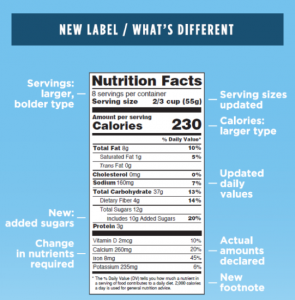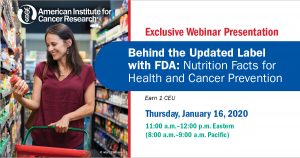Have you made a New Year’s resolution to eat a healthier diet that helps to reduce your cancer risk? Good news – updates to the Nutrition Facts label on packaged foods and drinks can make it easier for you to meet your goals.
As of January 1, 2020, products made by large food companies must have a new nutrition facts label which includes several key changes. You will see bigger, bolder calories and updated serving size information, making it easier to see how many calories are in a serving and how much of a particular food or drink the nutrition information pertains. After not smoking, managing weight is the most important thing one can do to reduce your cancer risk – and calorie and serving size information can be useful tools in doing so.
The serving sizes on the label have been updated specifically to reflect typical portion sizes, as the goal for the updated serving size is to reflect what people are actually eating. So when someone is looking at calories and other nutrient information, the numbers align more with what that person is consuming. It is important to remember that the labeled serving size is not necessarily the recommended portion size. For example, the updated label for the serving size for ice cream is larger, which allows consumers to be able to easily see the calories and other nutrient information in a typical serving of ice cream. AICR continues to recommend limiting the consumption of processed foods that are high in fat, starches or sugars to help control calorie intake and maintain a healthy weight.

Source: FDA (https://www.fda.gov/food/food-labeling-nutrition/changes-nutrition-facts-label)
The new label also now contains information about added sugars. Added sugars are added into products during packaging or processing, in contrast to naturally occurring sugars that are present in fruits, vegetables and dairy products. Percent Daily Values (% Daily Value) have also been updated on the label to put the information into context. To help manage weight, AICR recommends limiting sugar sweetened beverages, like soda and sweetened coffee and tea drinks – which can contain more than the full day’s limit of added sugars in a single 20 ounce bottle. Focus on drinking mostly water and unsweetened drinks.
The updated label will make it easier to follow AICR’s 10 recommendations for cancer prevention.
AICR supported these updates to the Nutrition Facts label as they made their way through the policymaking process at the U.S. Food & Drug Administration (FDA) over the past several years. As part of our work to change federal policies to make it easier for people to eat a cancer-protective diet, AICR submitted a comment letter in 2015 in response to the FDA’s proposed update that recommended some of these specific changes. Following release of the final updated label, AICR expressed support for timely implementation of the label updates, including signing onto a letter in 2017 with other leading nutrition and health organizations opposing a delay in the deadline. More recently, AICR has continued to support implementation of and education about the updated label, through communication with the FDA and development of new tools and resources for consumers and for health professionals.
In partnership with the FDA, AICR hosted a webinar for health professionals on January 16 to discuss the recent revisions to the Nutrition Facts label. If you want to learn more about these revisions and how the Nutrition Facts label can be a cancer prevention tool, watch the recording of the webinar here. You can also find new resources from AICR here on how to use the new label to make healthier choices.







After reading this post, I am making my mind to take the resolution of a healthy diet for the upcoming year. Thank you for the helpful post.